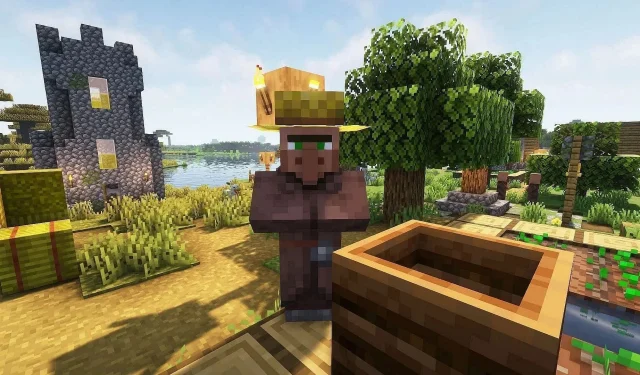
Are you searching for powerful enchantments, delicious cooked meat, or rare diamond gear in Minecraft? Villager jobs simplify access to these essential items. These iconic mobs offer valuable trades that can significantly enhance your gameplay and ease your survival experience.
With approximately 15 different types of villagers to discover in Minecraft, our detailed guide will prove invaluable. Grasping the intricacies of Minecraft villager jobs is crucial for optimizing the village trading system.
All Minecraft Villager Jobs in 2024
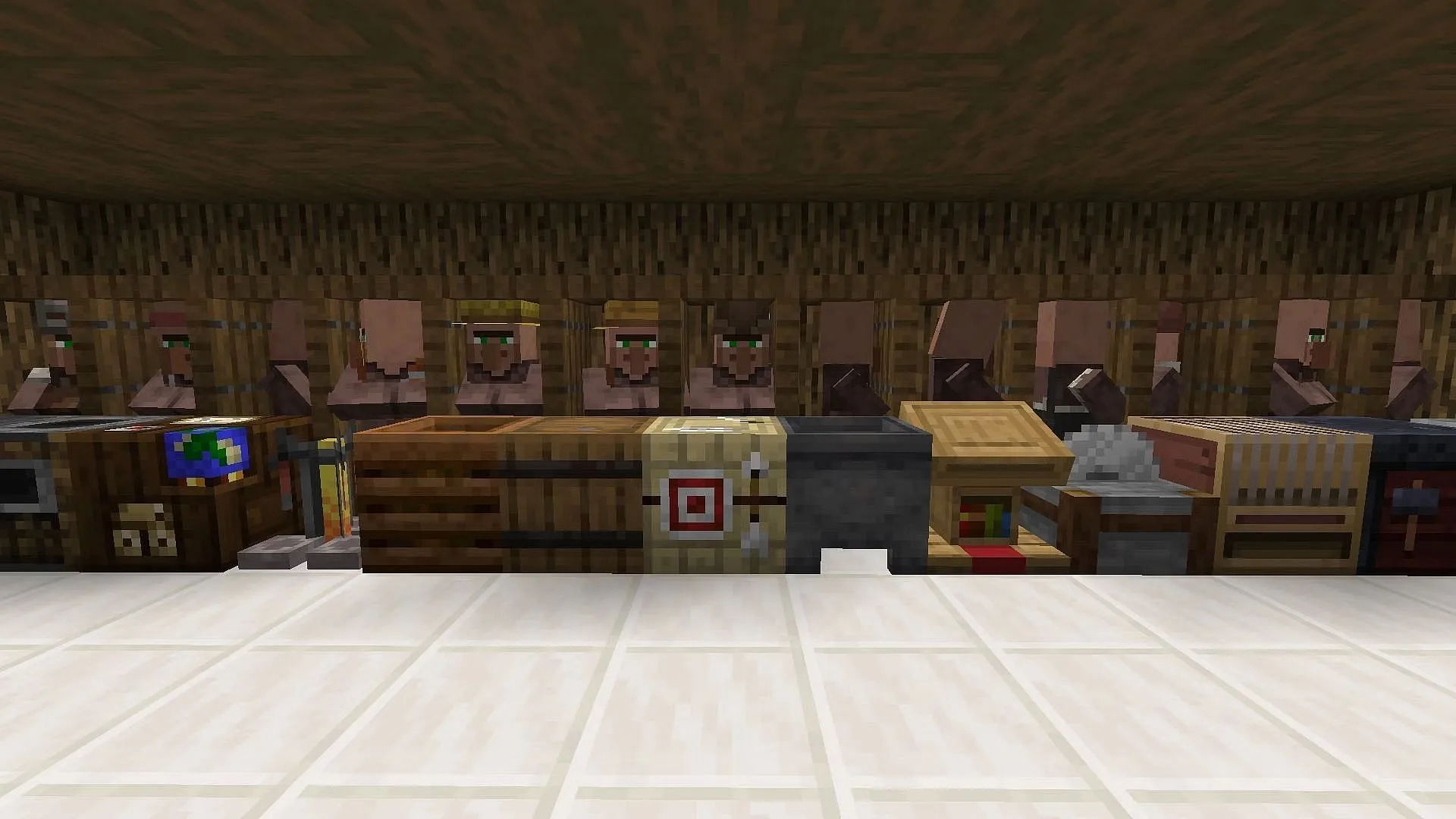
Minecraft features 15 villager job types, out of which 13 represent unique professions offering essential trades to players, while the remaining two, nitwit and unemployed, indicate a lack of jobs. Nitwits cannot assume jobs, and unemployed villagers require jobsite blocks to take on professions.
As players engage in trading with villagers, those villagers accumulate experience and unlock new trade options, progressing from novices to experts as trading continues. To assign jobs to unemployed villagers in Minecraft, players need to create and position specific jobsite blocks within their vicinity.
Here’s a comprehensive overview of the 13 Minecraft villager jobs available in the latest 1.21 update, along with the corresponding villager job blocks necessary for these professions:
| Minecraft Villager Job | Villager Job Block |
| Armorer | Blast Furnace |
| Butcher | Smoker |
| Cartographer | Cartography Table |
| Cleric | Brewing Stand |
| Farmer | Compost |
| Fisherman | Barrel |
| Fletcher | Fletching Table |
| Leatherworker | Cauldron |
| Librarian | Lectern |
| Mason | Stonecutter |
| Shepherd | Loom |
| Toolsmith | Smithing Table |
| Weaponsmith | Grindstone |
1) Armorer
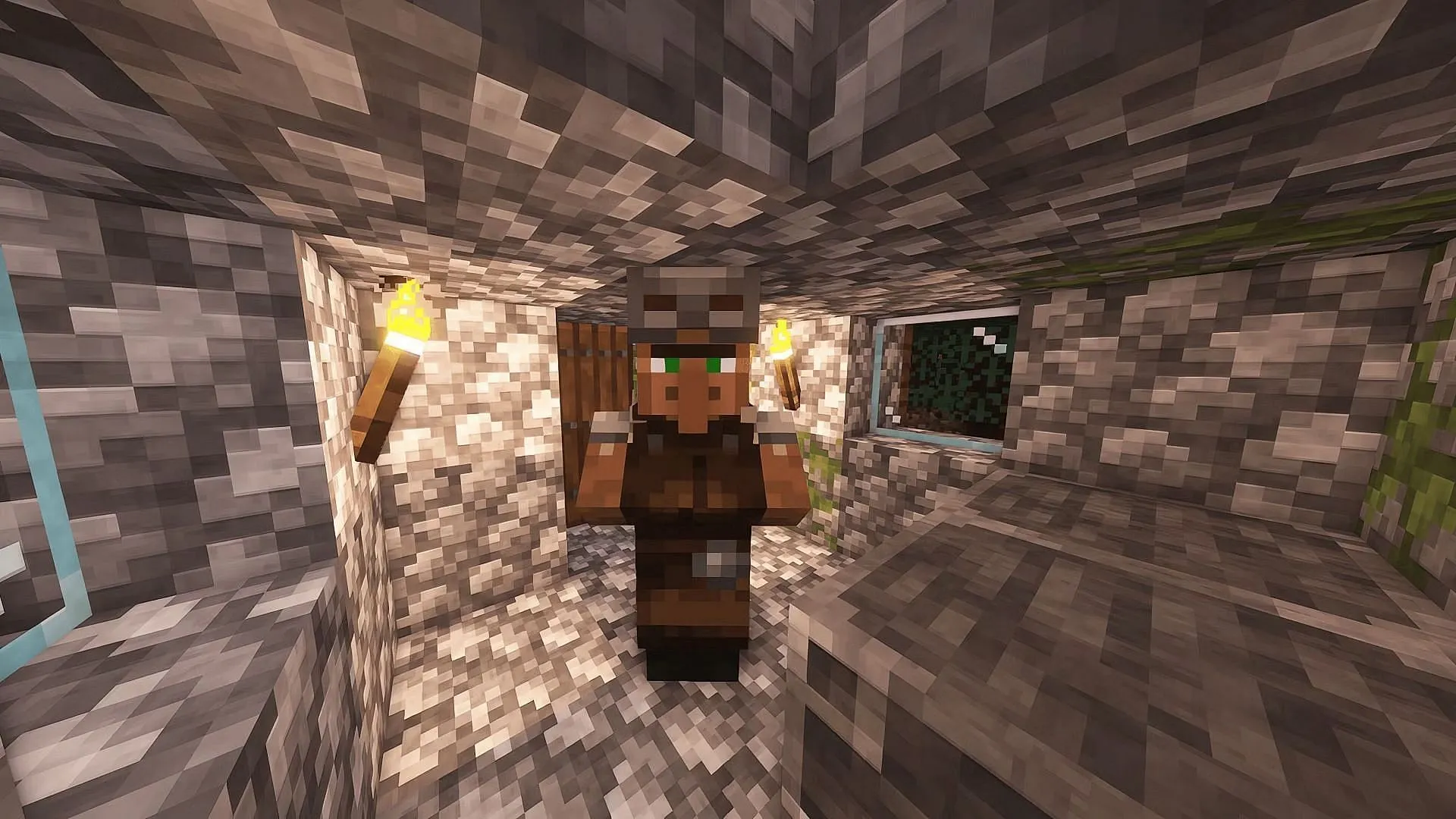
- Job block: Blast Furnace
- Trades armors, shields, and bells
A blast furnace block in Minecraft transforms a villager into an armorer, who specializes in working with and trading armor. They offer trades for items like iron armor, shields, and bell blocks. At expert and master levels, players can purchase enchanted diamond armor pieces from armorers using emeralds.
2) Butcher
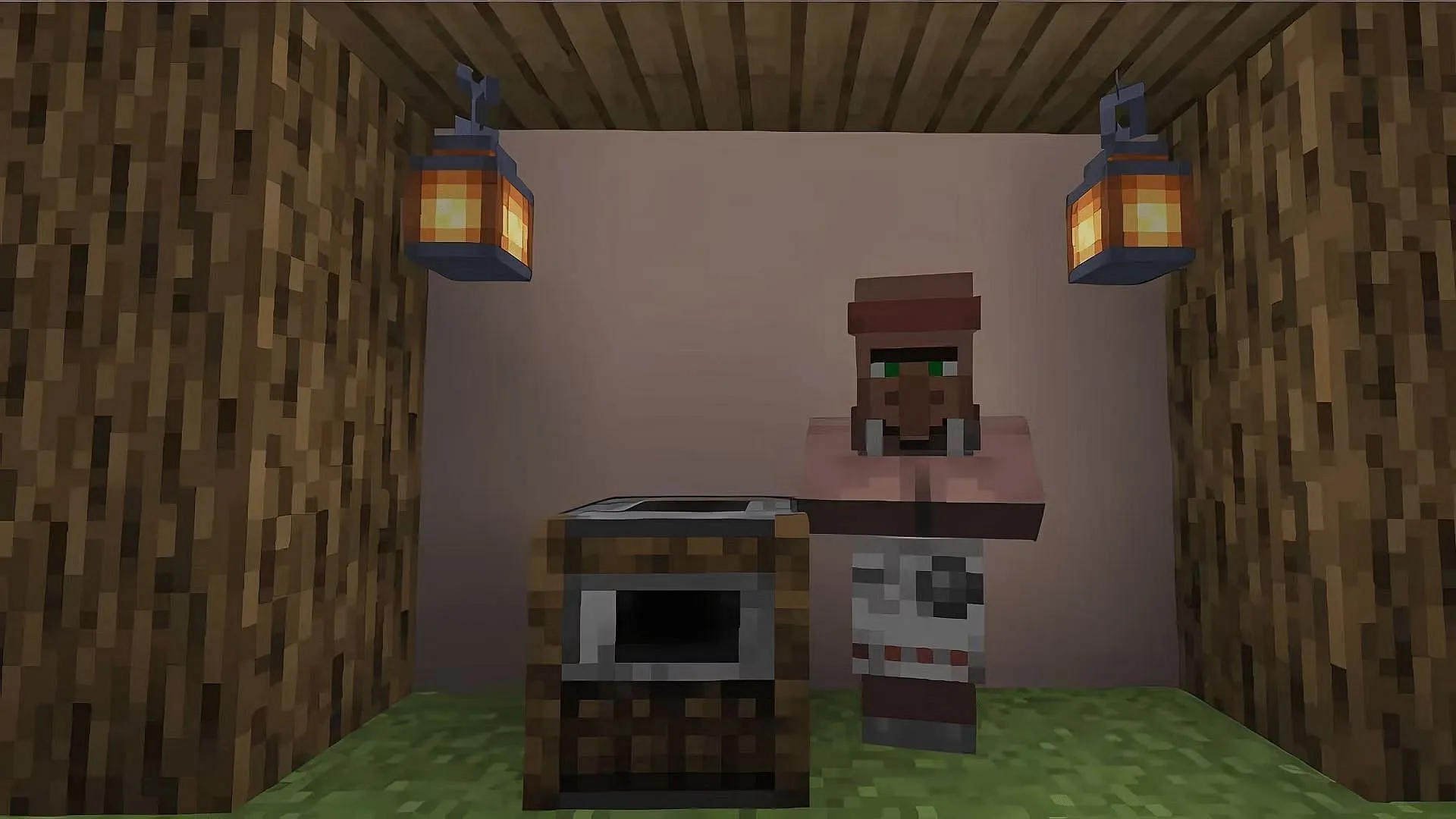
- Job block: Smoker
- Trades food-related items
A smoker block turns a villager into a butcher, who purchases raw meats from players and sells cooked meats. In addition to trading cooked pork chops and chicken, novice-level butchers will also offer rabbit stew for a mere single emerald. At higher levels, butchers will also buy dried kelp blocks, sweet berries, and raw beef/mutton.
3) Cartographer
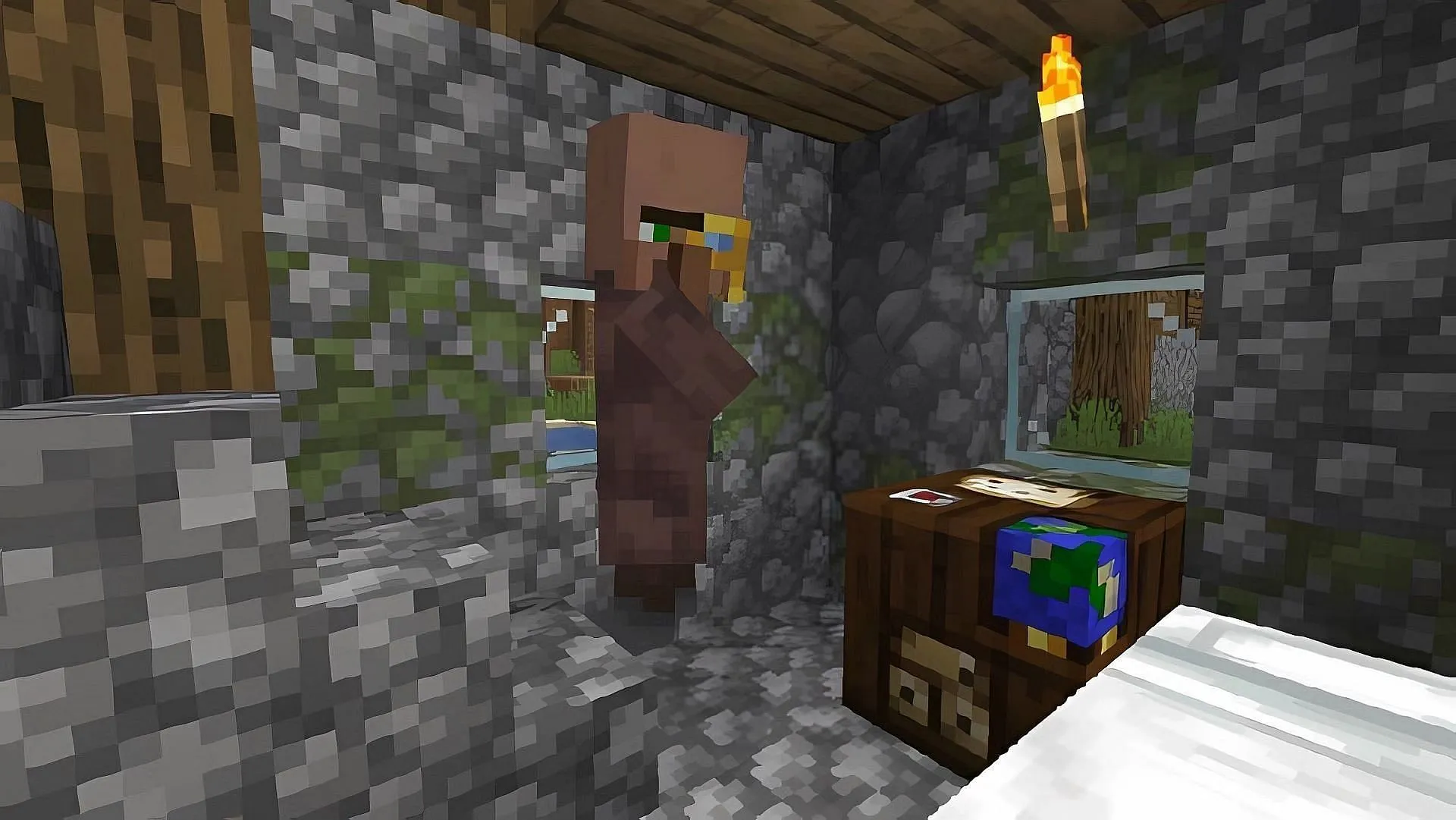
- Job block: Cartography Table
- Trades items like explorer maps, normal maps, and banners
A cartography table transforms a villager into a cartographer, who specializes in maps. Cartographers can sell empty maps, ocean and woodland explorer maps, with their offerings expanding as they gain experience.
As cartographers progress to expert and master levels, they can also sell item frames, blank banners of various colors, and the globe banner pattern.
4) Cleric
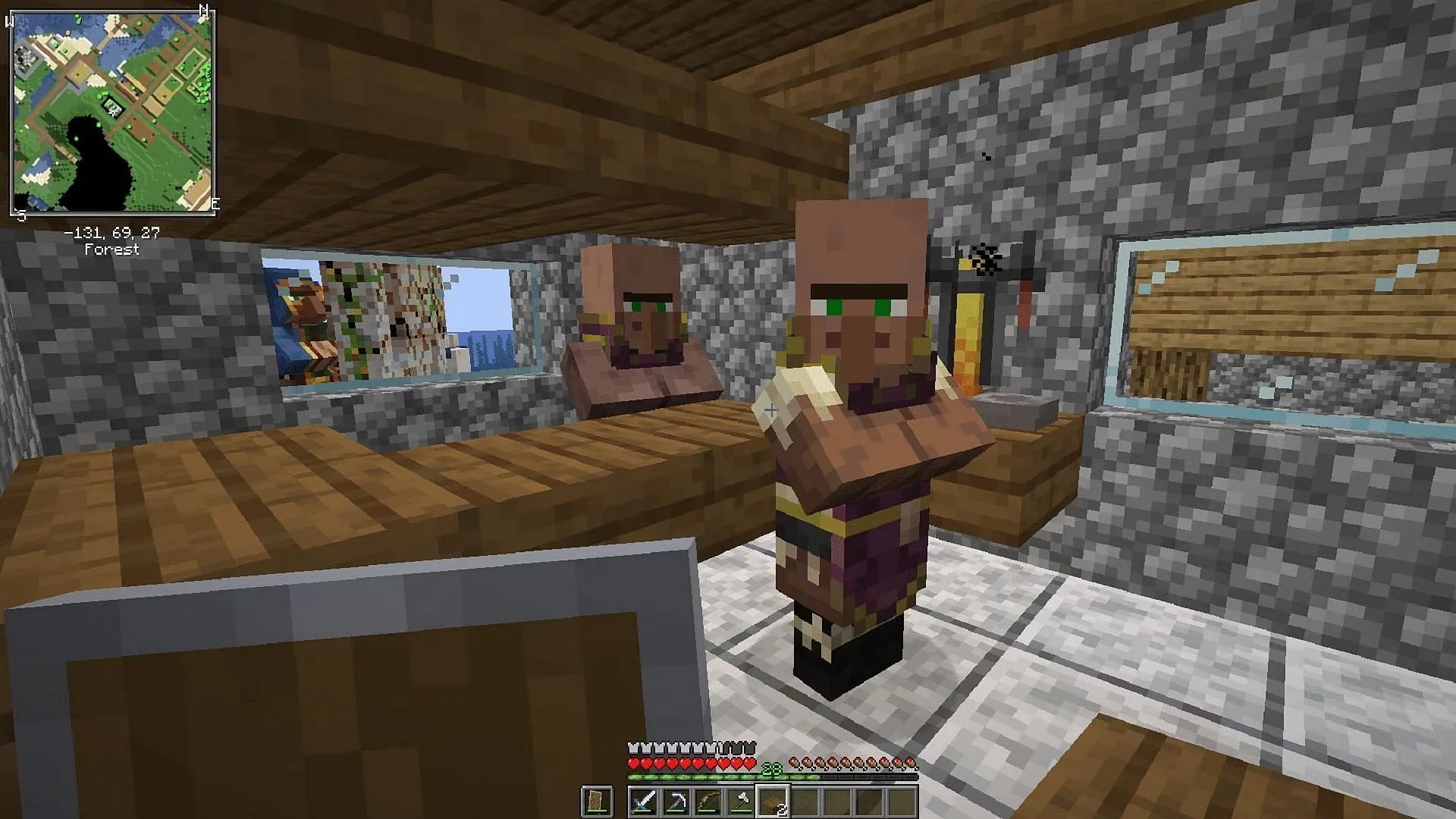
- Job block: Brewing Stand
- Trades redstone dust, lapis lazuli, Bottles O’ Enchanting, and ender pearls.
A brewing stand turns a villager into a cleric, who specializes in potions and trades brewing ingredients such as redstone dust and lapis lazuli. They will buy the rather useless rotten flesh item, and as they gain levels, they offer glowstone blocks and ender pearls.
Notably, master-level clerics can provide Bottles O’ Enchanting for purchase.
5) Farmer
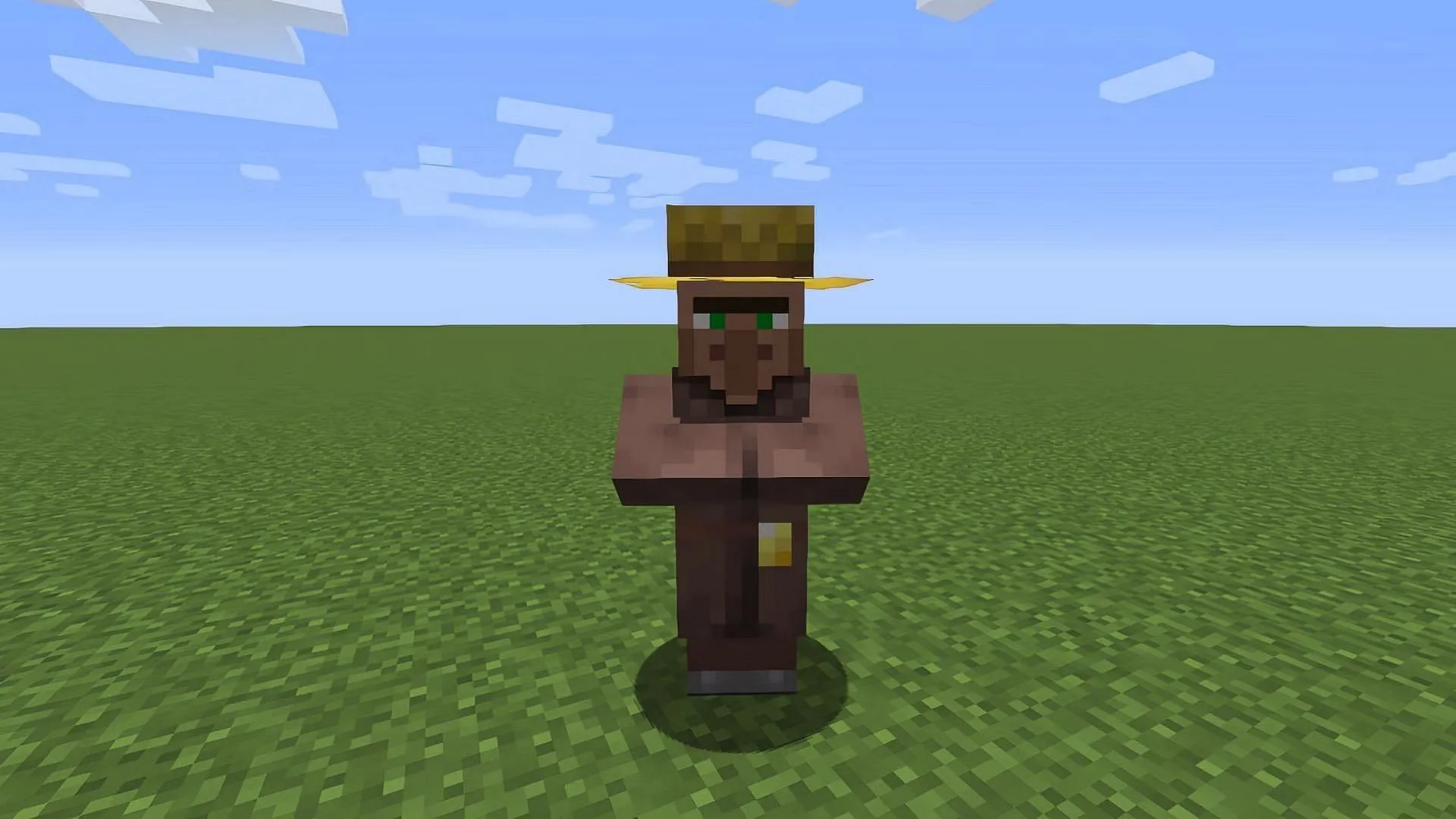
- Job block: Composter
- Trades melons, pumpkins, and other crops
A composter converts a villager into a farmer, who cultivates crops and trades farming-related items. Besides purchasing most in-game crops, farmers can sell various food items like bread, apples, cake, and cookies. At their highest profession levels, farmers will also sell different suspicious stews, golden carrots, and glistering melon slices.
Farmers are also crucial for feeding their fellow villagers, which helps increase the willingness of villages to breed if beds are available. They are recognized as one of the best Minecraft villager jobs for amassing emeralds.
6) Fisherman
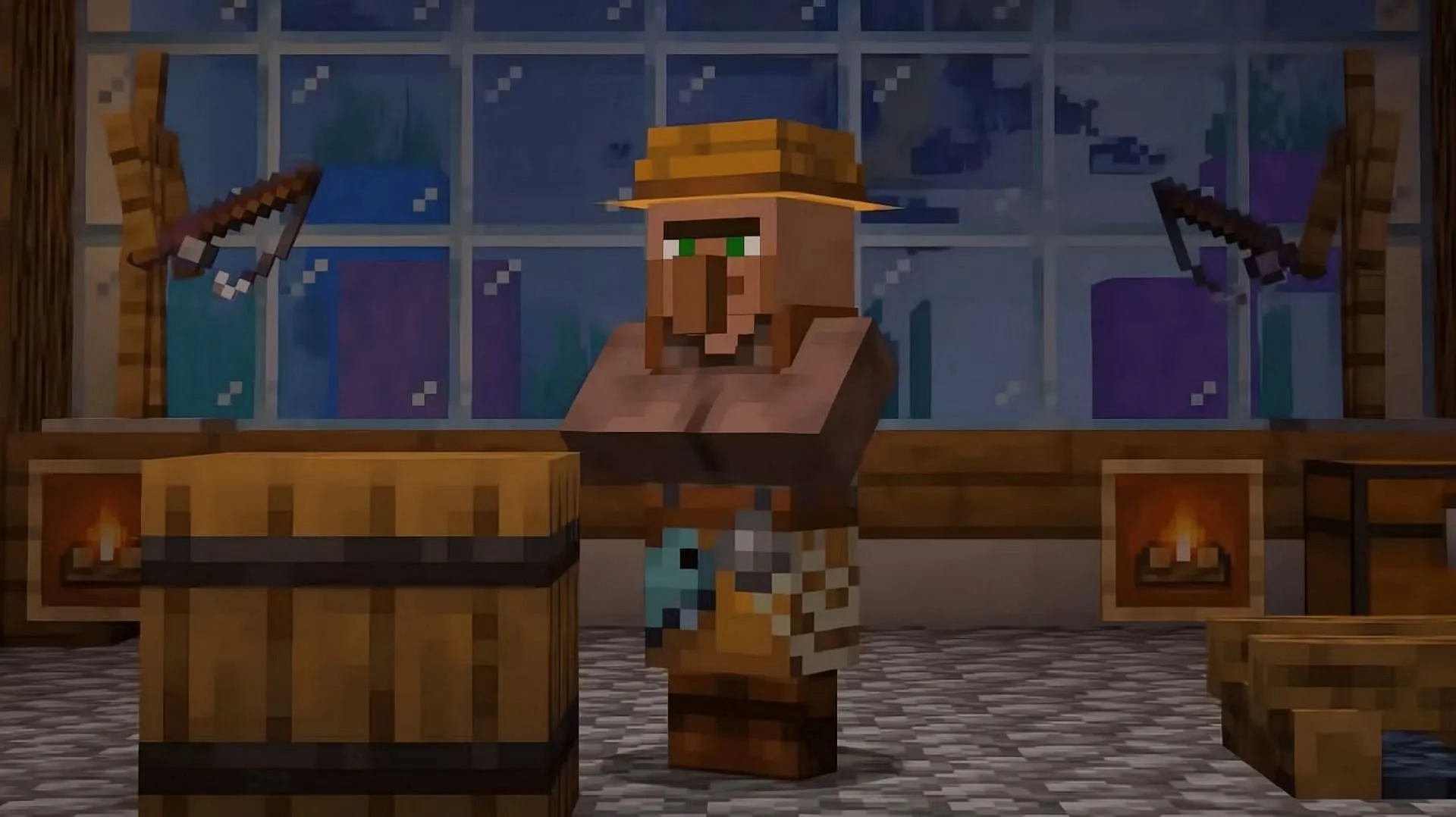
- Job block: Barrel
- Trades coal, various fishes, and boats
A barrel transforms a villager into a fisherman, who trades raw fish, coal, and string. This villager job also allows players to trade for cooked cod and salmon, buckets of live cod, and even campfire blocks as they progress. Journeyman-level fishermen will even sell enchanted fishing rods for emeralds.
7) Fletcher
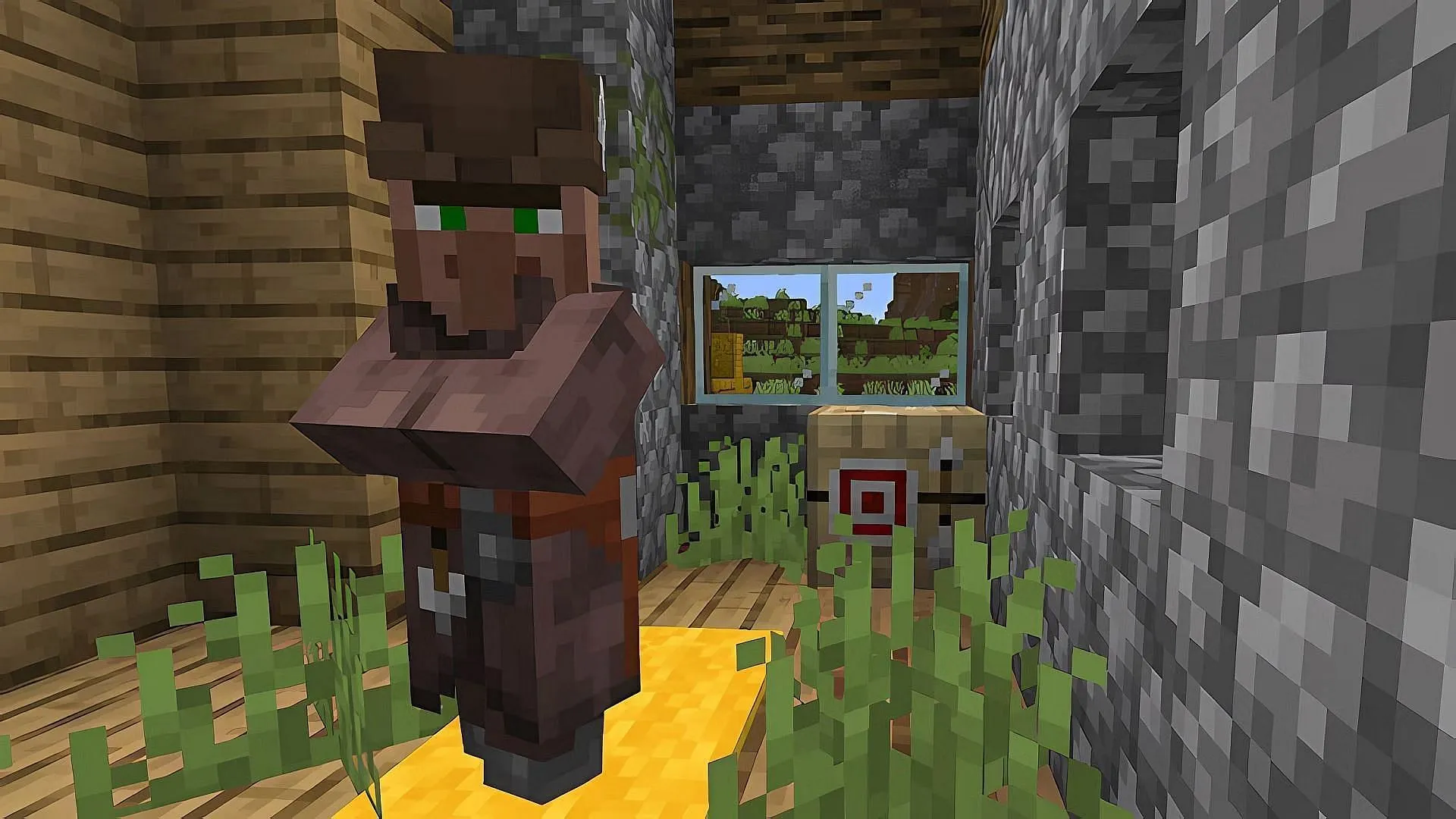
- Job block: Fletching Table
- Trades sticks, bows, and arrows
A fletching table turns a villager into a fletcher, who specializes in bows, crossbows, and their ammunition, including crafting materials like string and flint.
At expert and master experience levels, fletchers will even sell enchanted bows and crossbows as well as tipped arrows that grant various status effects.
8) Leatherworker
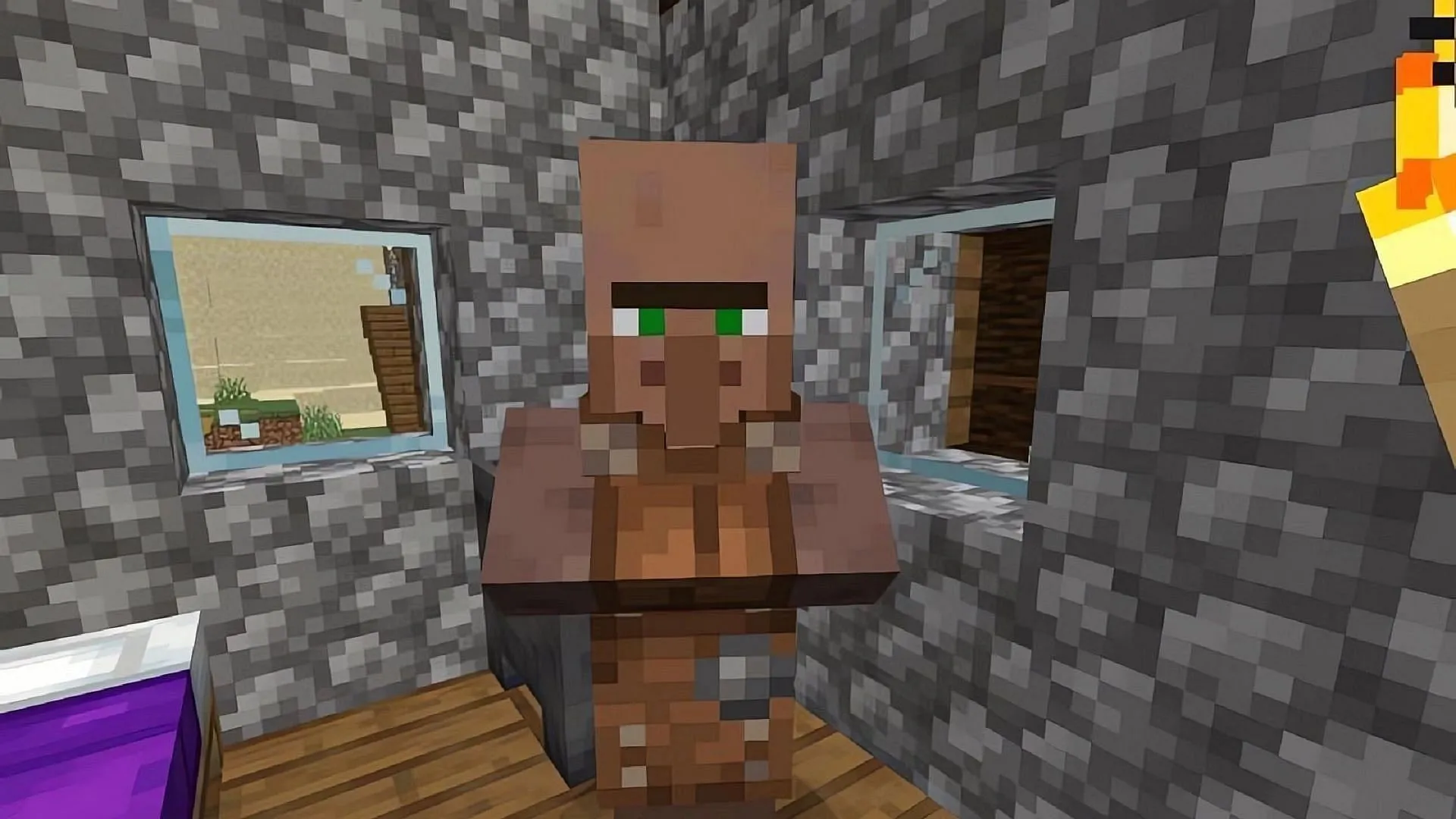
- Job block: Cauldron
- Trades saddles, leather, leather armor, and more
A cauldron converts an unemployed villager into a leatherworker. As the name indicates, leatherworkers offer leather armor pieces for both players and horses.
At the highest master level, they will also sell saddles for riding various in-game mobs.
9) Librarian
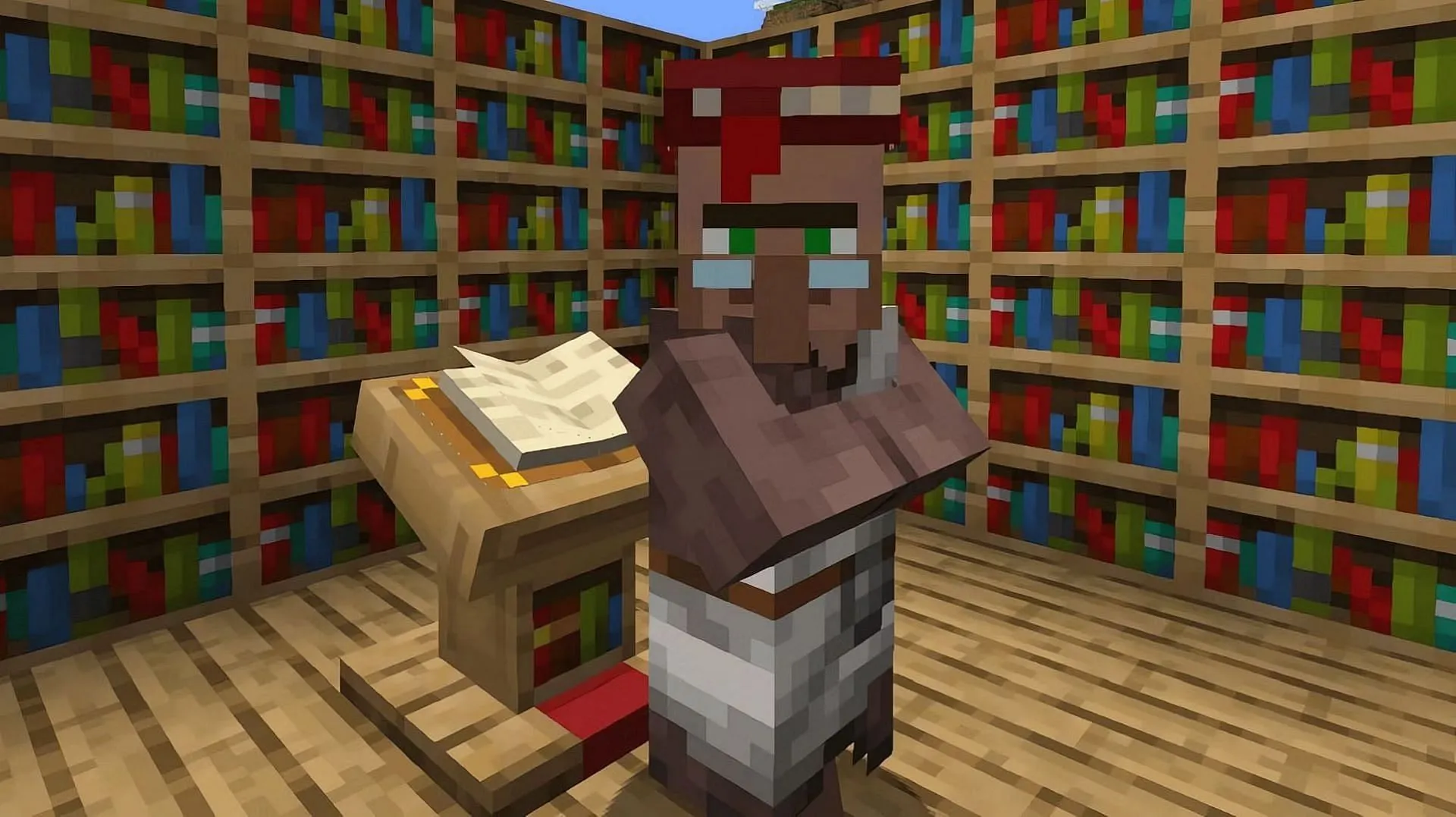
- Job block: Lectern
- Trades various enchantments, bookshelves, and name tags
A lectern turns a villager into a librarian, known for being one of the most valuable Minecraft villager jobs. They offer an array of items, including lanterns, bookshelves, clocks, compasses, and name tags, along with enchanted books. Players can acquire impressive enchantments early on simply by trading with librarian villagers.
Librarians have been revamped as part of the updates to Minecraft villager jobs, with the enchantments they offer now depending on their biome and profession level, providing top-tier enchantments only at the master level.
10) Mason
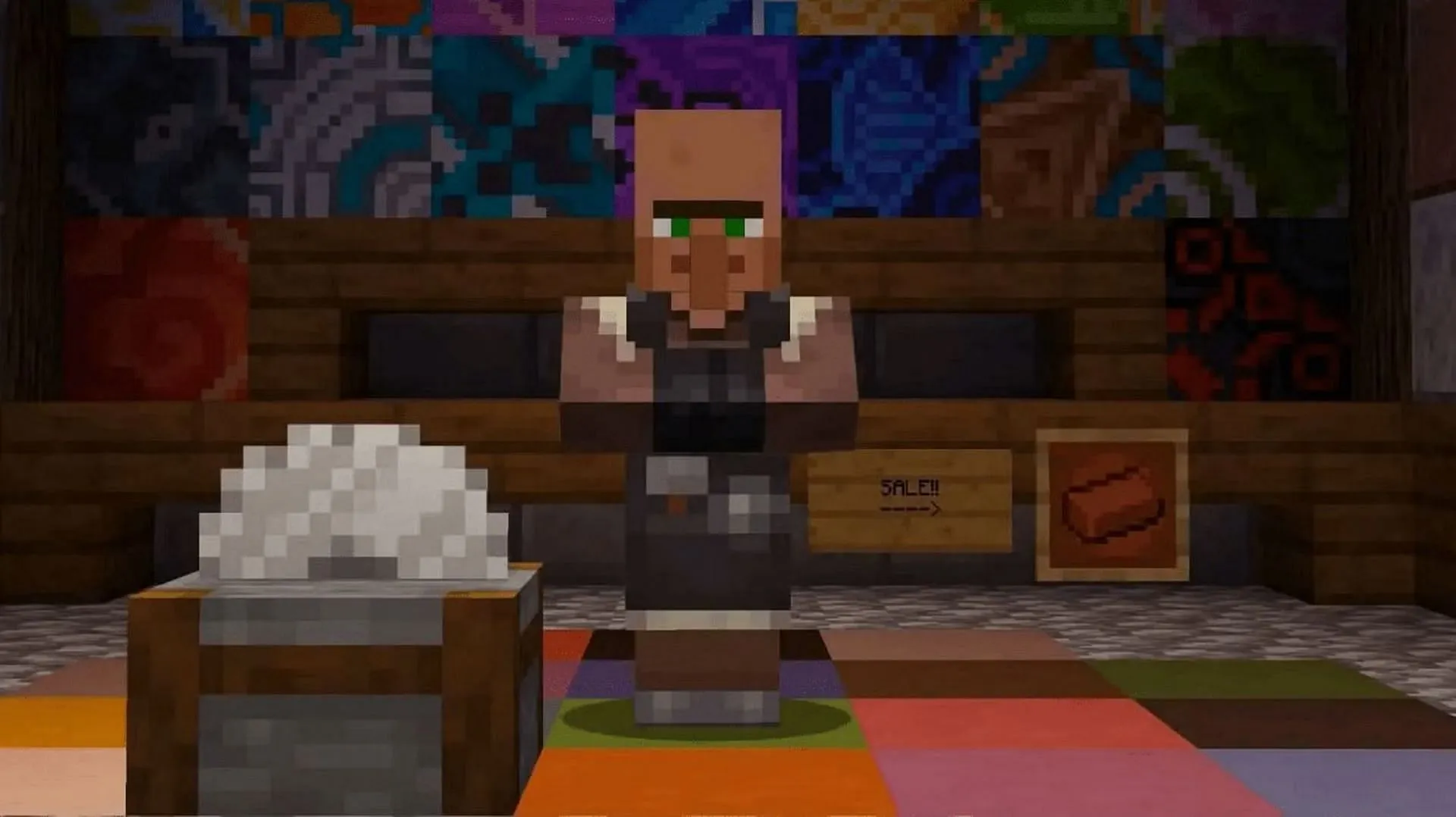
- Job block: Stonecutter
- Trades terracotta, bricks, dripstone, and other stone blocks
A stonecutter block transforms a villager into a mason, who works with a variety of stone and clay blocks. They sell bricks, polished andesite, diorite, and granite, along with dripstone blocks. At higher levels, masons offer colored and glazed terracotta and even quartz blocks.
11) Shepherd
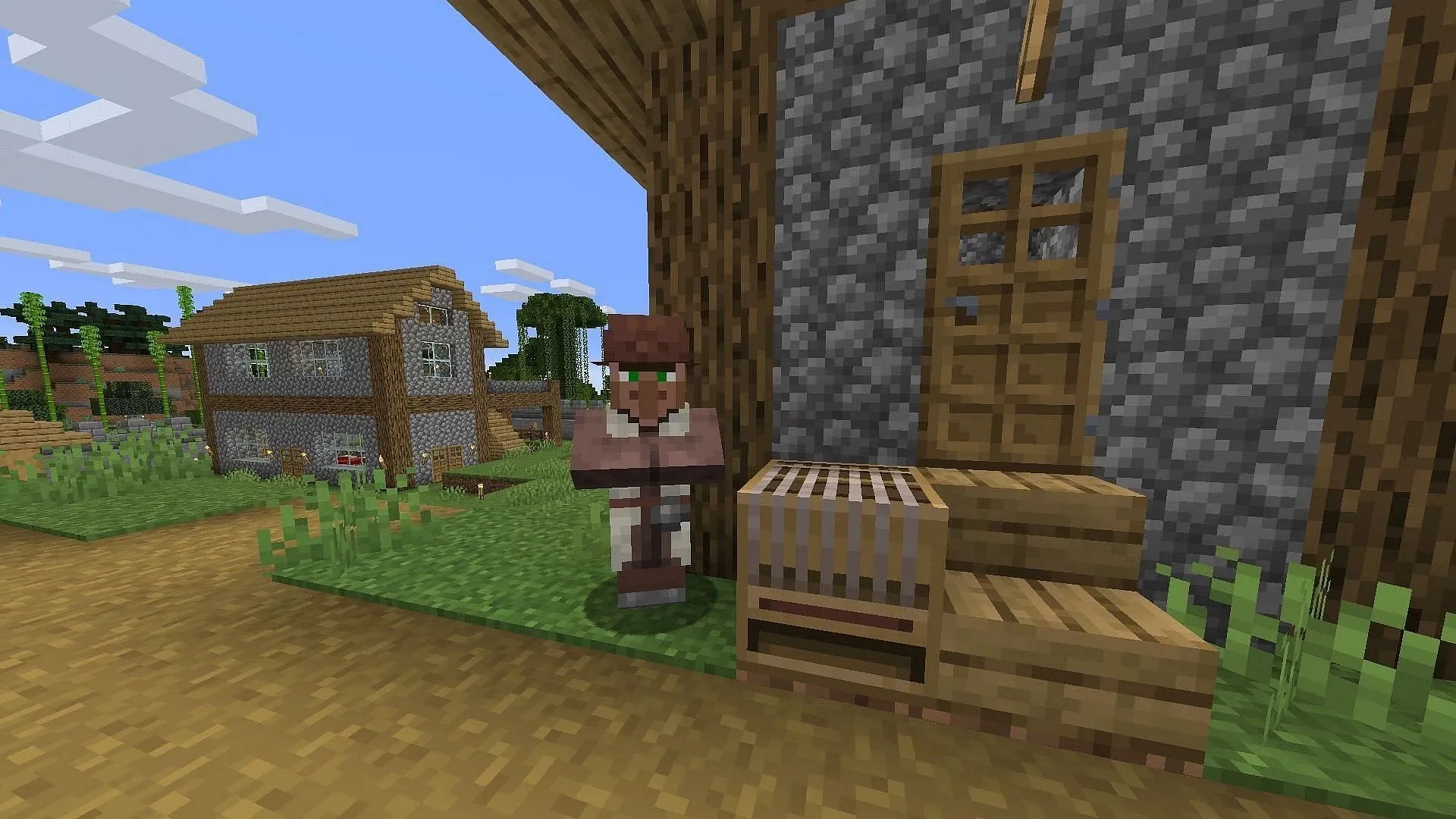
- Job block: Loom
- Trades wool-related items
A loom block converts a villager into a shepherd, specializing in trading dyes and wool blocks. Their trades primarily focus on dyes and wool blocks, progressing to sales of shears, beds, carpets, and colorful banners.
At the master level, shepherds will also offer paintings for emeralds, though this is not necessarily the best trade option.
12) Toolsmith
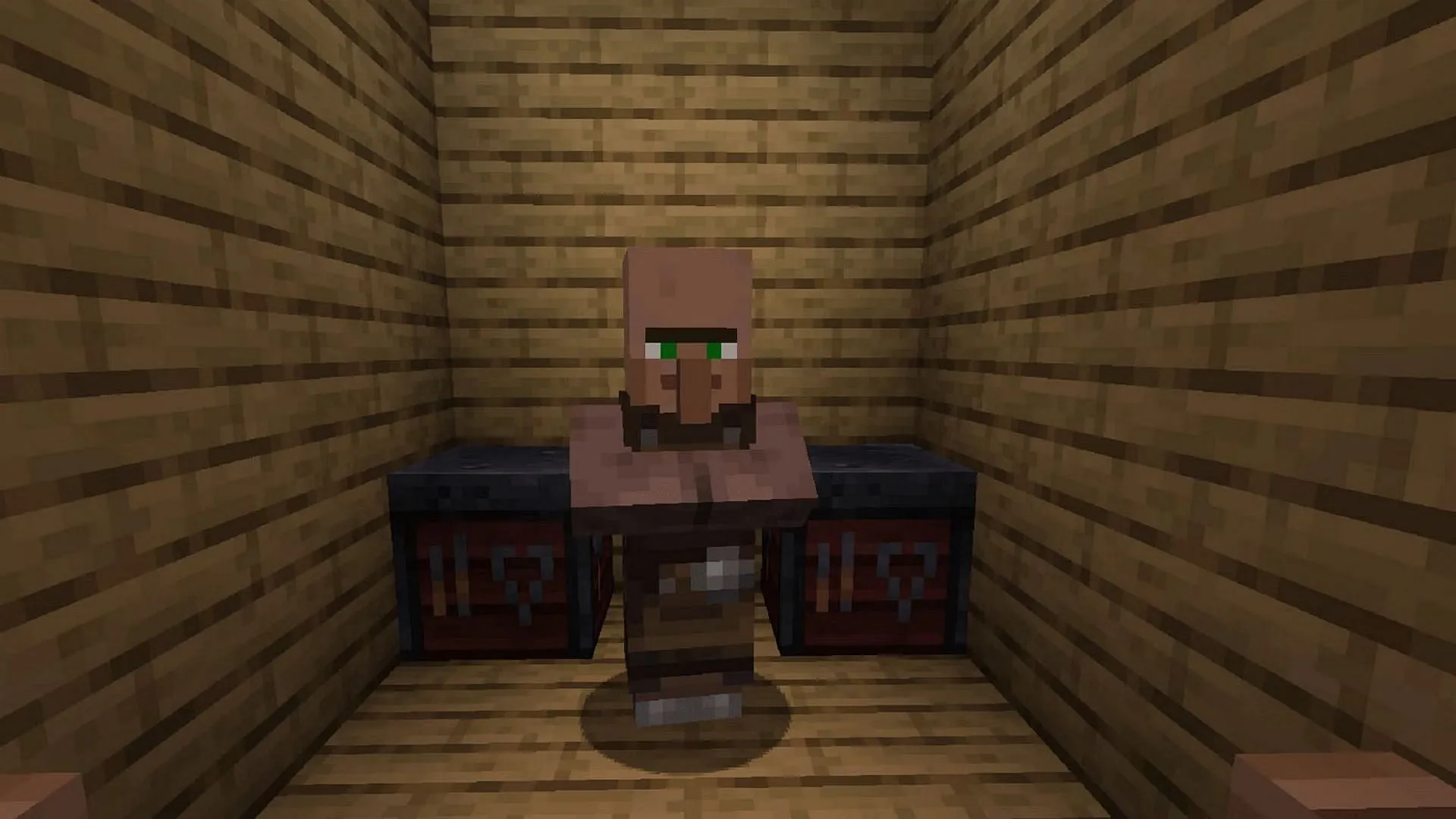
- Job block: Smithing Table
- Trades tools like axe, pickaxe, and shovel
A smithing table transforms a villager into a toolsmith, who specializes in trading quality tools such as pickaxes, axes, and shovels. As they gain experience, toolsmiths provide higher quality tools, including diamond tools and enchanted diamond tools that are highly sought after, making this one of the Minecraft villager jobs you want in your world.
13) Weaponsmith
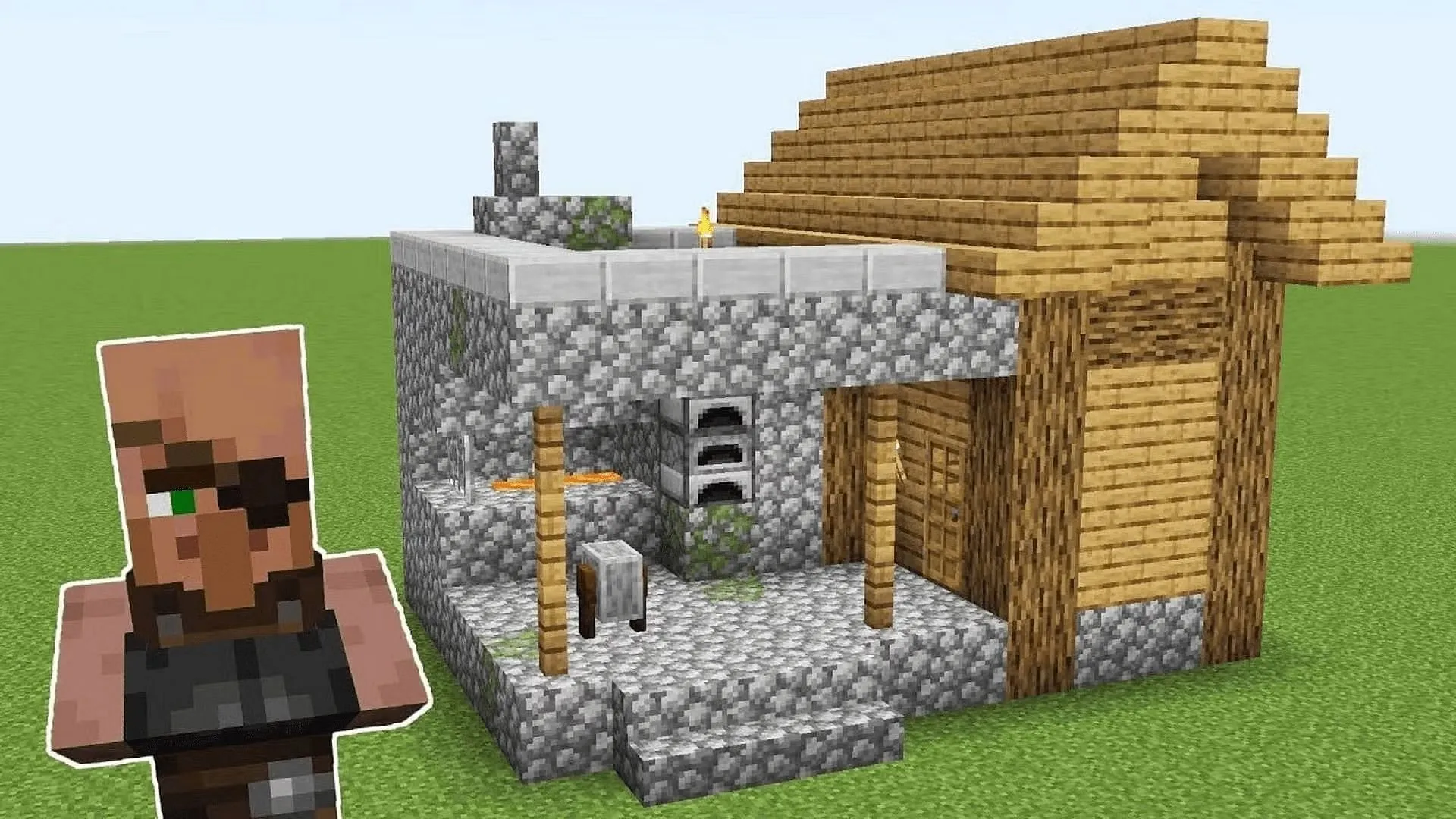
- Job block: Grindstone
- Trades swords and axes
A grindstone block transforms a villager into a weaponsmith, who focuses on trading iron weapons and enchanted iron swords. Early levels offer iron weapons like swords and axes, and at the highest levels, weaponsmiths sell enchanted diamond axes and swords in exchange for emeralds. This makes it one of the few Minecraft villager jobs that can provide diamond gear.
14) Nitwit
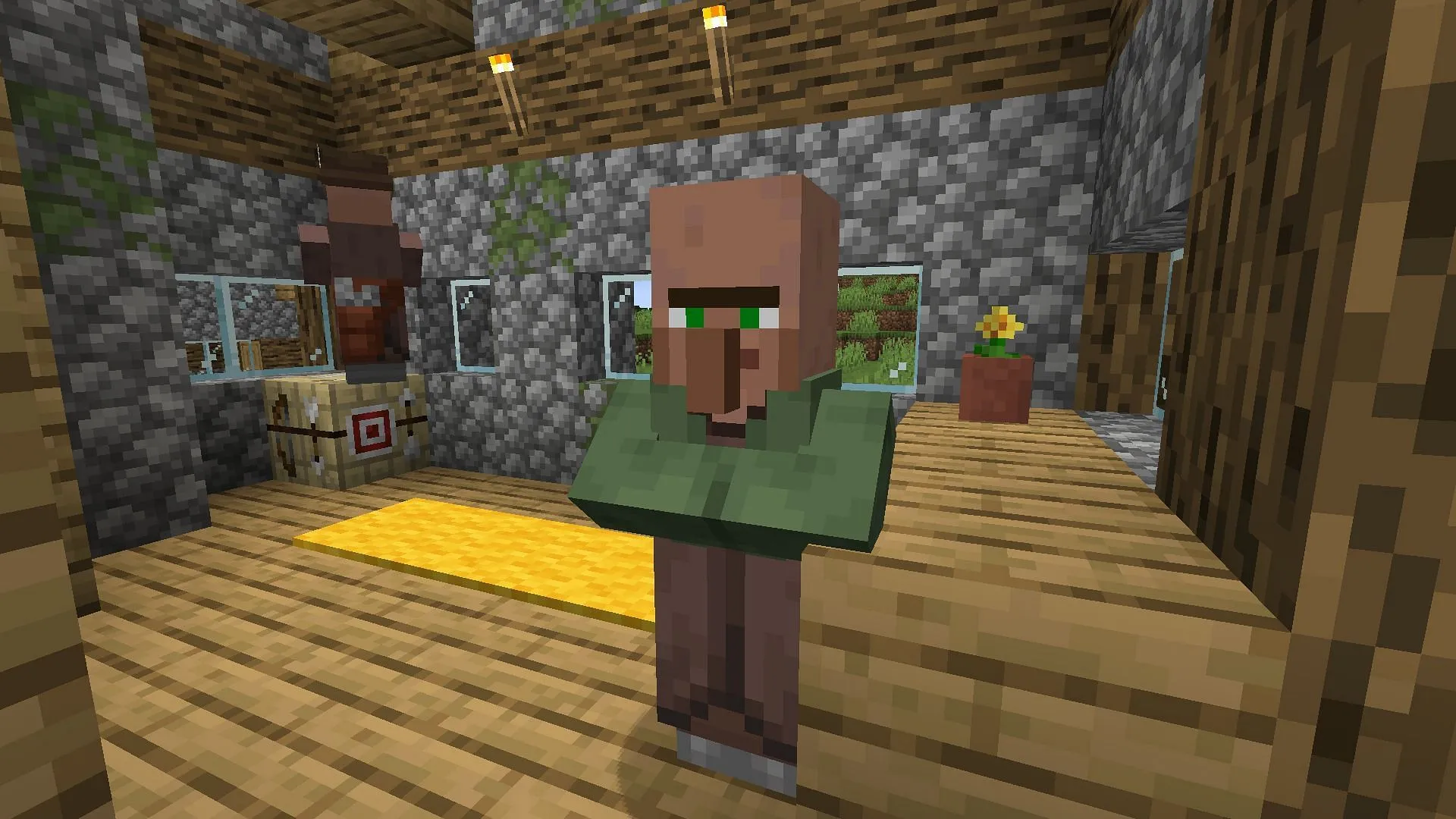
Nitwits may resemble regular villagers, but they have distinct differences, such as wearing green robes instead of traditional villager attire. They cannot take on any jobs, rendering them unhelpful for trading.
Additionally, nitwits wake up and go to sleep later than other villagers, often exposing them to risk from zombies at night. Fortunately, nitwits are rare, making encounters infrequent.
15) Unemployed
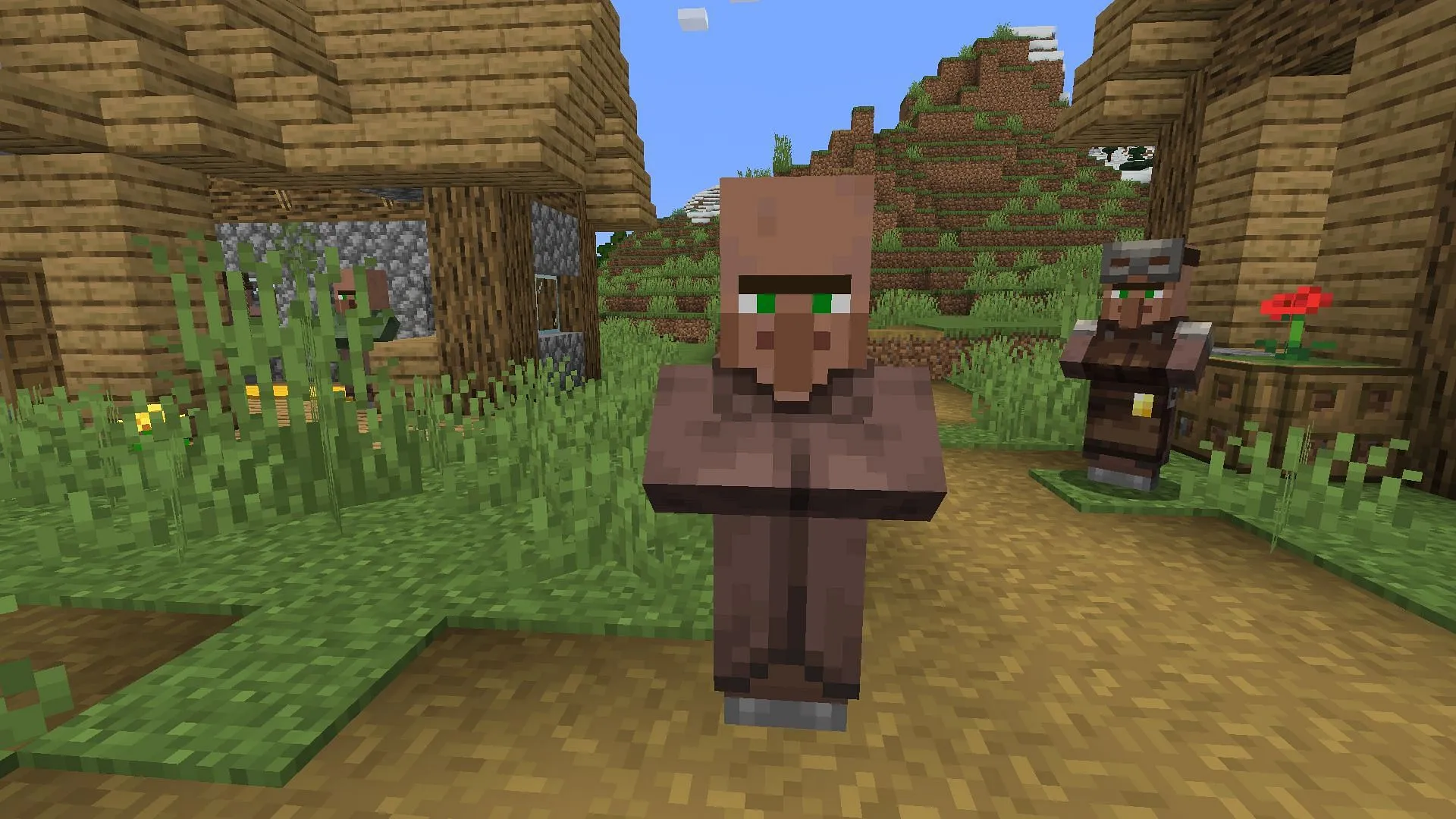
Unemployed villagers are simply villagers without a profession, which can occur for various reasons. They may lack sufficient job blocks in the village or face obstacles in accessing job blocks.
Occasionally, a villager may become unemployed after switching professions too frequently, triggering a cooldown. However, you can assign a job to an unemployed villager by placing an appropriate job block nearby.
Wandering Trader
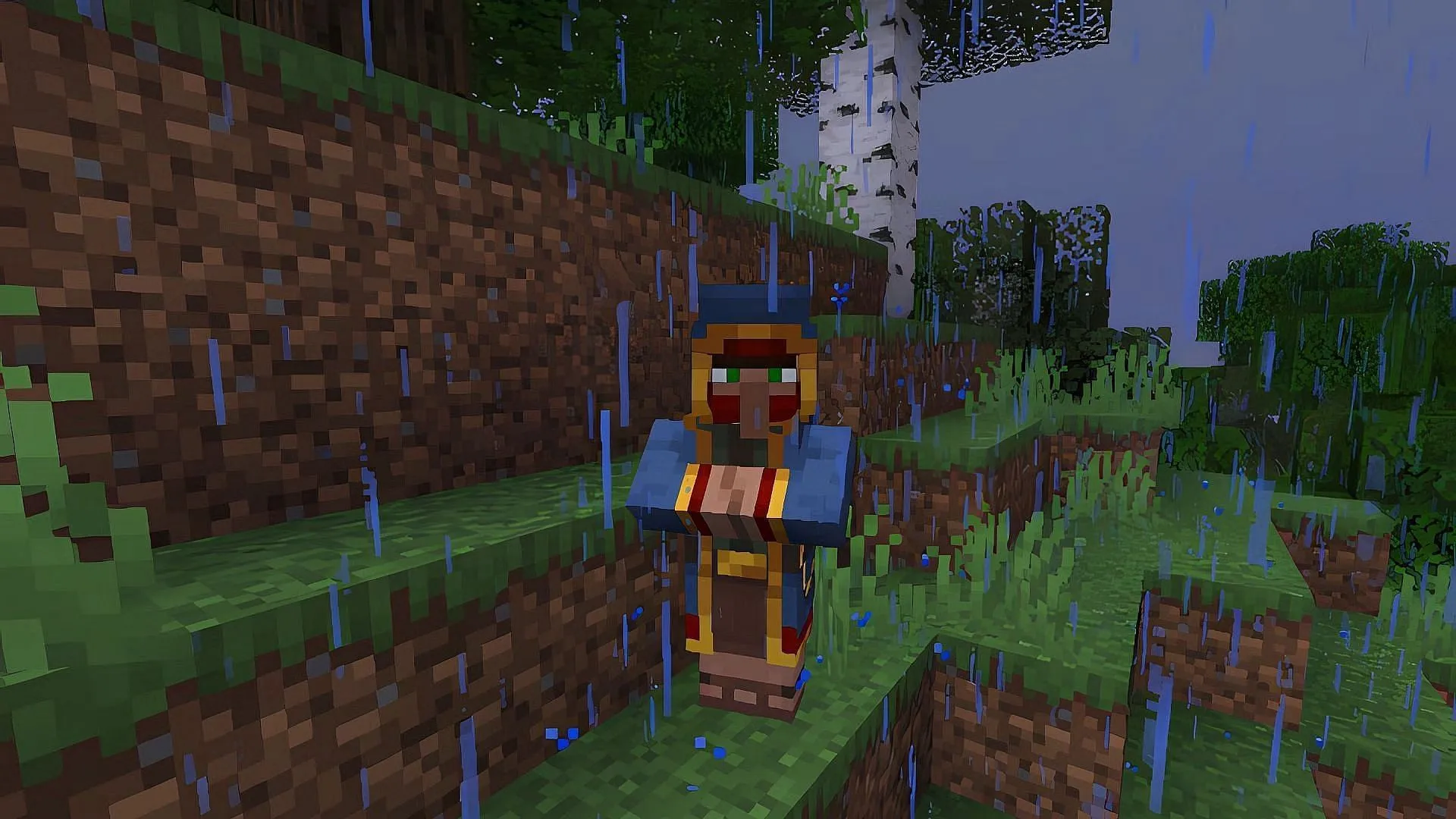
- Trades flowers, dyes, seeds, and more
Although the Wandering Trader isn’t technically classified as one of the Minecraft villager jobs, it behaves similarly and offers trades. This trader often has natural resources or other rare items, although prices can be high and not always reasonable.
Wandering Traders appear randomly near a player’s location and despawn after a period. Players are encouraged to explore their trades and consider purchasing anything useful. These nomadic villagers present a wide range of items, from rare flowers to various saplings.
Fortunately, Minecraft’s 23w31a snapshot has revamped the Wandering Trader, enabling it to buy certain materials from players along with selling. Additionally, the trader’s prices have been adjusted for better value and inventory expansion.
How to Change Minecraft Villager Jobs
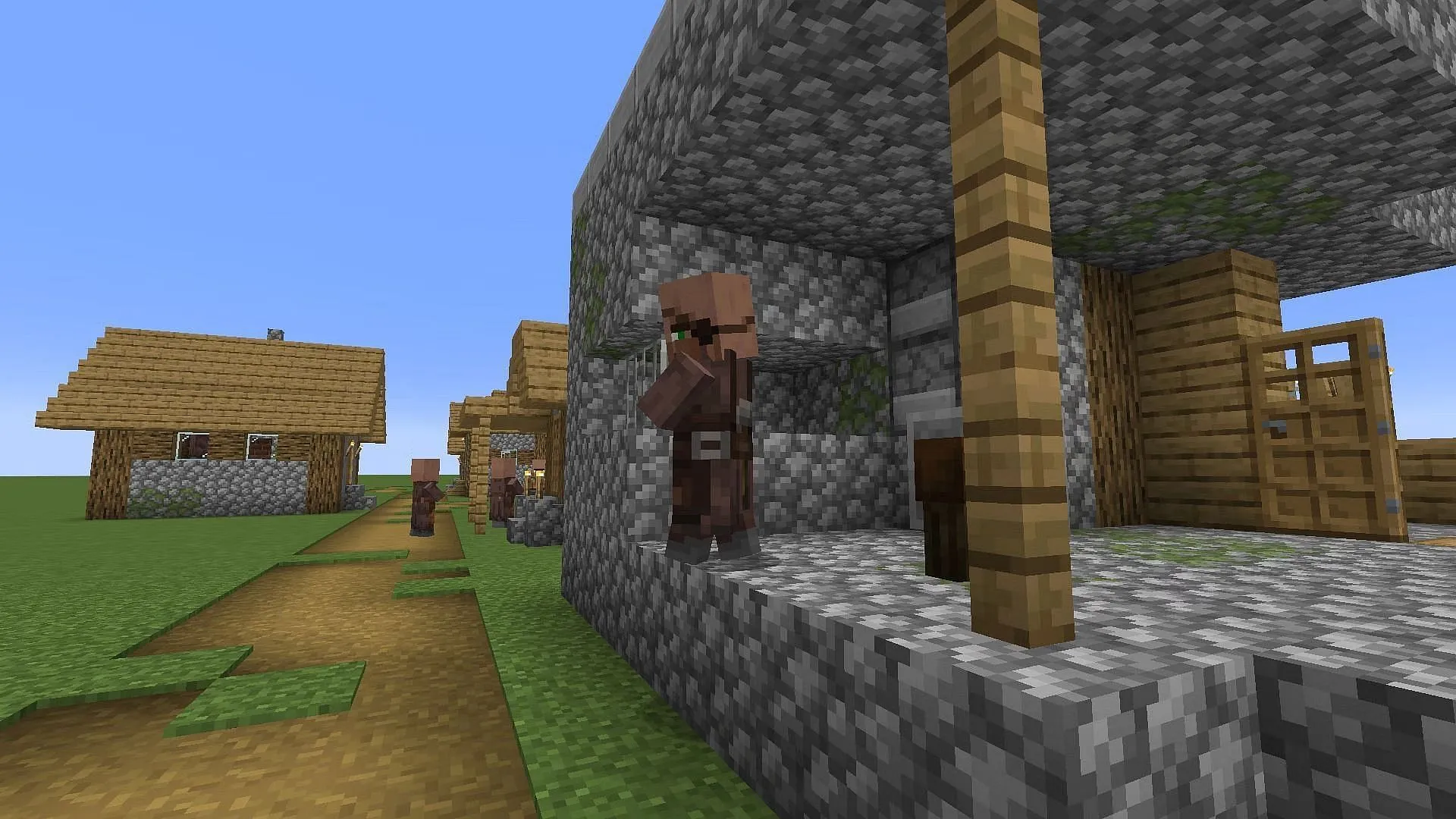
If players wish to modify a villager’s profession, they can easily do so by positioning the appropriate job block nearby during the right time of day. Villagers are inactive early in the morning and late at night, but switching jobs is straightforward during working hours.
To change a villager’s job, follow these simple steps:
- Identify and remove the current job block: Locate the workstation used by the villager and break it to convert the villager into an unemployed one.
- Place the new job block: During regular working hours, position the desired job block nearby, ensuring the villager has unobstructed access.
- Wait for the villager to claim the block: The villager will approach the new job block and adopt the corresponding profession, starting as a novice.
How to Get Minecraft Villager Jobs (Villager Job Blocks)
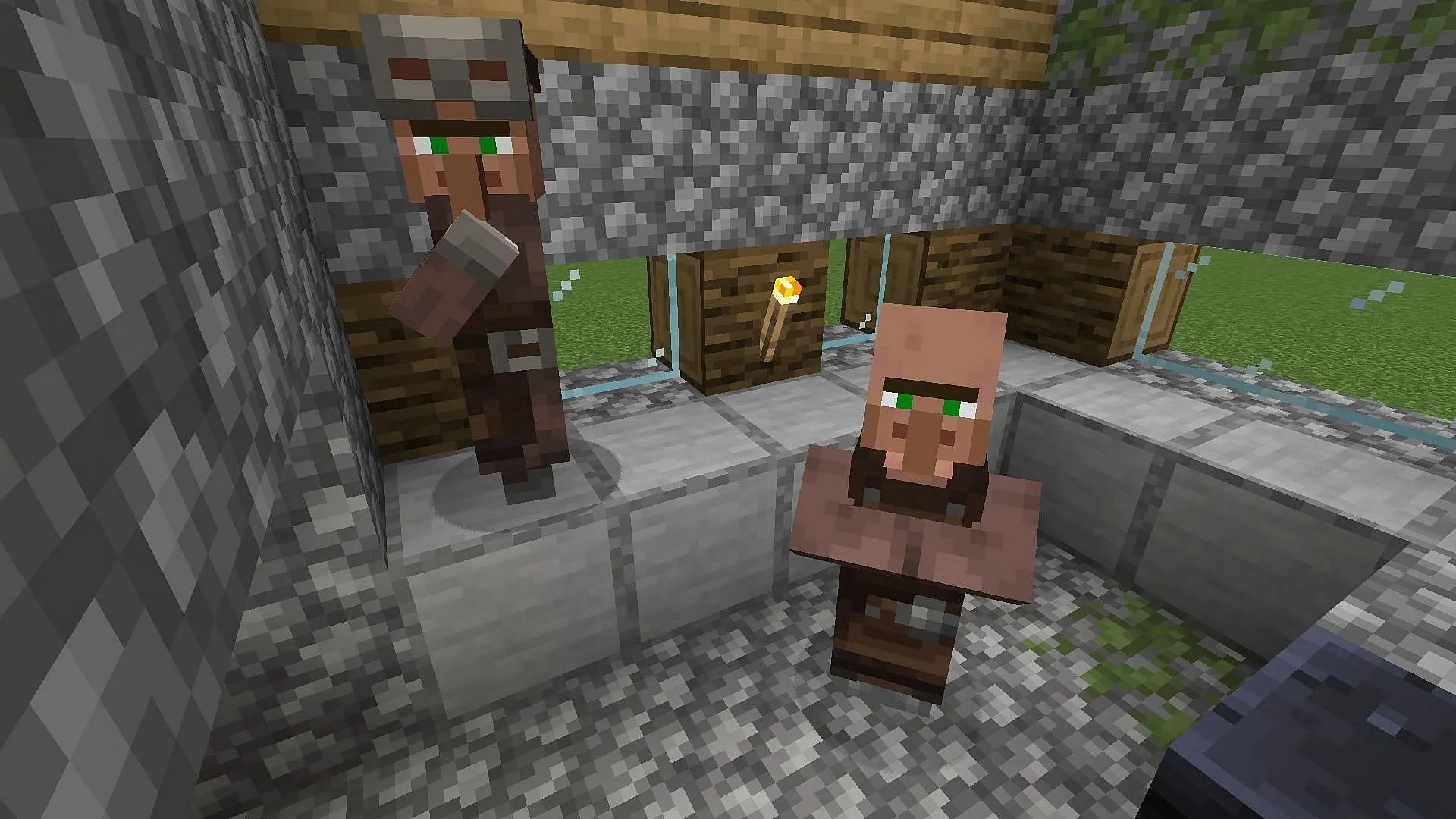
Villagers require a job site block to obtain a profession. Should you observe several unemployed villagers, simply place job site blocks in the village, ensuring they are accessible. The villagers will claim their jobs during their daily activities as long as the blocks are within reach.
Nitwit villagers, distinguishable by their green tunics, are the exception to this rule. These villagers do not trade or acquire jobs.
Each villager requires their own specific job site block, as multiple villagers cannot share the same workstation. Other factors such as housing, bedding, or food do not influence their ability to obtain a profession, provided they have access to a job block.
Here’s a summary of all villager job blocks in Minecraft along with the crafting ingredients required:
| Job Block | Crafting Ingredients |
| Blast Furnace | Five iron ingots, one furnace, three smooth stones |
| Smoker | Any four wood blocks, one furnace |
| Cartography Table | Any four planks, two paper |
| Brewing Stand | Any cobblestone block, one blaze rod |
| Compost | Any seven wooden slabs |
| Barrel | Any six wooden planks, two wooden slabs |
| Fletching Table | Any four wooden planks, two flints |
| Cauldron | Seven iron ingots |
| Lectern | Any four wooden planks, one bookshelf |
| Stonecutter | One iron ingot, three stone blocks |
| Loom | Any two planks, two strings |
| Smithing Table | Two iron ingots, any four planks |
| Grindstone | Any two planks, two sticks, one stone slab |
Minecraft Villager Trading Rebalance Explained
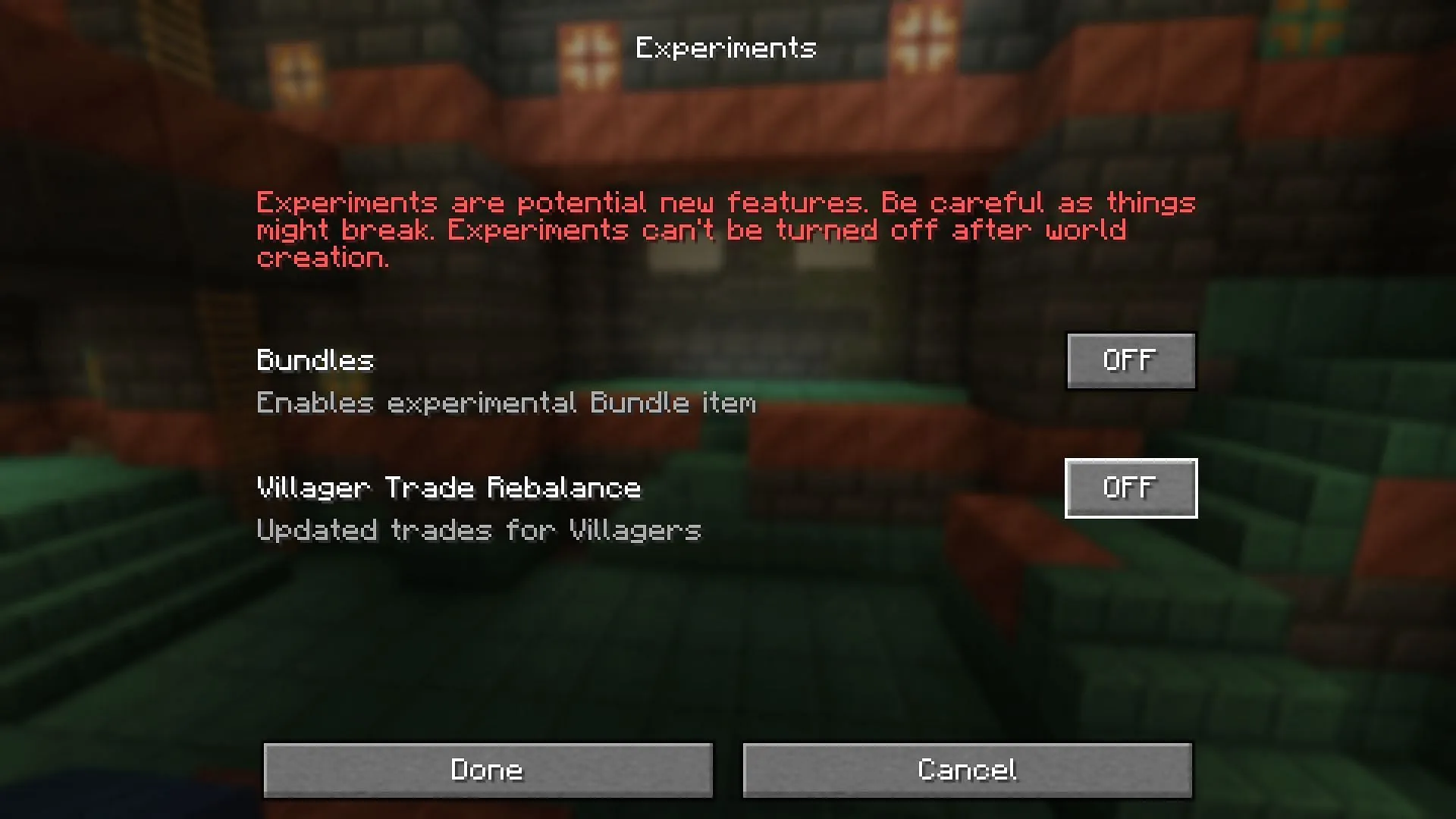
The villager trading rebalance is an experimental option available during the creation of a new world in Minecraft. Mojang aims to nerf trades from powerful villager jobs like librarians and armorers, while enhancing weaker jobs like cartographers.
Cartographers will offer a variety of explorer maps tailored to their biomes, and librarians’ enchanted book trades will also become biome-dependent, limiting available enchantments. This encourages players to explore diverse biomes and villages within their Minecraft worlds.
To experience the villager trading rebalances, create a new world and enable the Villager Trade Rebalance datapack under Experiments in Java Edition or the Villager Trade Rebalancing setting in the Experiments section of Bedrock Edition. Note that these changes are experimental, and there’s no guarantee they will be permanently implemented.
Minecraft Villager Jobs FAQs
1) Why isn’t a villager losing their job?
- A villager will retain its job if it has completed a trade already. Once a player has traded with a villager, their job cannot be changed. If the villager’s XP bar is above zero or they have unlocked more than two trades, they cannot lose their job.
2) Are there jobless villagers?
- In Minecraft, players can encounter villagers without jobs, referred to as “nitwits.”Nitwits do not choose a job when near workstation blocks. They often engage in late-night activities, sleep in, and play with baby villagers.
3) Why won’t villagers take a job?
- If a villager is not a nitwit, it may be unable to secure a job because another villager is using the workstation. Players can increase available workstation blocks and be patient for the villager to claim a job.
4) Why aren’t villagers restocking their trades?
- Villagers need access to their workstations in order to refill their trades. If the workstation is too distant, they will be unable to restock. Villagers typically restock their trades twice daily in Minecraft.
5) Which villagers sell diamond weapons, armor, and tools in Minecraft?
- Players can acquire diamond weapons from master-level weaponsmiths, diamond tools from master-level toolsmiths, and diamond armor pieces from master-level armorers. Many of these items often come with beneficial enchantments as well.
6) What villager job is considered the best in Minecraft?
- Weaponsmiths, armorsmiths, and toolsmiths are typically regarded as the top villager jobs in Minecraft. These villagers can offer enchanted diamond equipment in exchange for emeralds. Additionally, librarians and farmers are excellent for generating emeralds and providing an unlimited food supply.




Leave a Reply